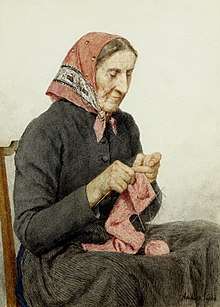stricken
See also: Stricken
English
Pronunciation
- IPA(key): /ˈstɹɪkən/
Audio (US) (file) - Rhymes: -ɪkən
Adjective
stricken (comparative more stricken, superlative most stricken)
- Struck by something. (Can we add an example for this sense?)
- Disabled or incapacitated by something.
- 1914, Louis Joseph Vance, chapter III, in Nobody, New York, N.Y.: George H[enry] Doran Company, published 1915, OCLC 40817384:
- Turning back, then, toward the basement staircase, she began to grope her way through blinding darkness, but had taken only a few uncertain steps when, of a sudden, she stopped short and for a little stood like a stricken thing, quite motionless save that she quaked to her very marrow in the grasp of a great and enervating fear.
-
- Removed or rubbed out.
- (warships) Having its name removed from a country's naval register, e.g. the United States Naval Vessel Register.
Derived terms
Translations
Verb
stricken
- past participle of strike
- 1913, Robert Barr, chapter 4, in Lord Stranleigh Abroad:
- Nothing could be more business-like than the construction of the stout dams, and nothing more gently rural than the limpid lakes, with the grand old forest trees marshalled round their margins like a veteran army that had marched down to drink, only to be stricken motionless at the water’s edge.
-
German

Stricken
Etymology
From Old High German stric, most likely from Proto-Indo-European *streyg- (“line”).
Pronunciation
- IPA(key): /ˈʃtʀɪkŋ̩/, /ˈʃtʀɪkən/
Audio (Austria) (file) Audio (file)
Verb
stricken (third-person singular simple present strickt, past tense strickte, past participle gestrickt, auxiliary haben)
Conjugation
Conjugation of stricken
| infinitive | stricken | ||||
|---|---|---|---|---|---|
| present participle | strickend | ||||
| past participle | gestrickt | ||||
| auxiliary | haben | ||||
| indicative | subjunctive | ||||
| present | ich stricke | wir stricken | i | ich stricke | wir stricken |
| du strickst | ihr strickt | du strickest | ihr stricket | ||
| er strickt | sie stricken | er stricke | sie stricken | ||
| preterite | ich strickte | wir strickten | ii | ich strickte | wir strickten |
| du stricktest | ihr stricktet | du stricktest | ihr stricktet | ||
| er strickte | sie strickten | er strickte | sie strickten | ||
| imperative | strick (du) stricke (du) |
strickt (ihr) | |||
Composed forms of stricken
| perfect | |||||
|---|---|---|---|---|---|
| indicative | ich habe gestrickt | wir haben gestrickt | subjunctive | ich habe gestrickt | wir haben gestrickt |
| du hast gestrickt | ihr habt gestrickt | du habest gestrickt | ihr habet gestrickt | ||
| er hat gestrickt | sie haben gestrickt | er habe gestrickt | sie haben gestrickt | ||
| pluperfect | |||||
| indicative | ich hatte gestrickt | wir hatten gestrickt | subjunctive | ich hätte gestrickt | wir hätten gestrickt |
| du hattest gestrickt | ihr hattet gestrickt | du hättest gestrickt | ihr hättet gestrickt | ||
| er hatte gestrickt | sie hatten gestrickt | er hätte gestrickt | sie hätten gestrickt | ||
| future i | |||||
| infinitive | stricken werden | subjunctive i | ich werde stricken | wir werden stricken | |
| du werdest stricken | ihr werdet stricken | ||||
| er werde stricken | sie werden stricken | ||||
| indicative | ich werde stricken | wir werden stricken | subjunctive ii | ich würde stricken | wir würden stricken |
| du wirst stricken | ihr werdet stricken | du würdest stricken | ihr würdet stricken | ||
| er wird stricken | sie werden stricken | er würde stricken | sie würden stricken | ||
| future ii | |||||
| infinitive | gestrickt haben werden | subjunctive i | ich werde gestrickt haben | wir werden gestrickt haben | |
| du werdest gestrickt haben | ihr werdet gestrickt haben | ||||
| er werde gestrickt haben | sie werden gestrickt haben | ||||
| indicative | ich werde gestrickt haben | wir werden gestrickt haben | subjunctive ii | ich würde gestrickt haben | wir würden gestrickt haben |
| du wirst gestrickt haben | ihr werdet gestrickt haben | du würdest gestrickt haben | ihr würdet gestrickt haben | ||
| er wird gestrickt haben | sie werden gestrickt haben | er würde gestrickt haben | sie würden gestrickt haben | ||
Related terms
- Strick
- verstricken
- bestricken
- umstricken
Further reading
- stricken in Duden online
This article is issued from
Wiktionary.
The text is licensed under Creative
Commons - Attribution - Sharealike.
Additional terms may apply for the media files.